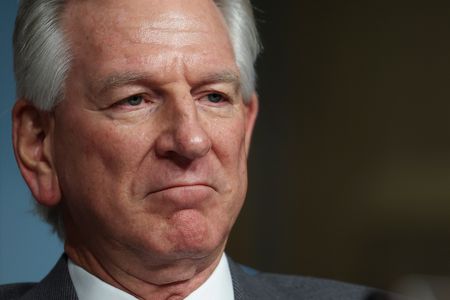 1
1 1
1
By Steve Holland, Doina Chiacu and Phil Stewart
HELSINKI (Reuters) – President Joe Biden said on Thursday he expects Republicans to stand up against what he called Senator Tommy Tuberville’s “ridiculous” block of top U.S. military appointments over the Pentagon’s abortion policy.
It was bizarre and irresponsible to inject a domestic social debate into fundamental foreign policy, the Democratic president said in Helsinki after meeting with Nordic country leaders.
Tuberville, a conservative Republican from Alabama, has held up 250 nominees to senior Pentagon posts since March, when he began the holds to protest a Defense Department policy enacted last year that provides paid leave and reimburses costs for service members who travel to get an abortion.
“He’s jeopardizing U.S. security with what he’s doing. I expect the Republican Party to stand up – stand up and do something about it,” Biden told reporters.
“I’m confident that the mainstream Republican Party no longer – does not support what he’s doing, but they’ve got to stand up and be counted. That’s how it ends,” Biden said.
Biden said he would be willing to talk to Tuberville if there were any possibility of changing the senator’s “ridiculous position.”
Defense Secretary Lloyd Austin spoke to Tuberville on Thursday, the Pentagon said.
“Secretary Austin explained to Senator Tuberville the impact the holds are having to military readiness and uncertainty in the force,” Pentagon spokesperson Patrick Ryder told a news briefing.
Austin and Tuberville agreed to speak again next week, Ryder said.
Speaking earlier on Thursday, Austin told CNN: “He needs to lift the holds.”
“This is a national security issue. It’s a readiness issue. And we shouldn’t kid ourselves,” Austin said.
Tuberville said in a Twitter post late on Wednesday he had a 10-minute call with Austin months ago and accused Democrats of political theater.
On Tuesday, Biden’s nominee to become the top U.S. general warned that Tuberville’s blockade of military promotions could have a far-reaching impact across the armed forces, affecting U.S. troops and their families.
“We will lose talent,” General Charles “CQ” Brown, the outgoing Air Force chief of staff, told his Senate confirmation hearing to become chairman of the Joint Chiefs of Staff.
Senior military nominations are approved by the Armed Services Committee and eventually the full Senate. Although the review is usually routine, a single senator can pause the process by putting a hold on nominations that force them to be considered one at a time, taking many hours each.
Tuberville’s action already has had an impact. On Monday, when retiring General David Berger formally relinquished command, the Marine Corps was left without a Senate-confirmed leader for the first time in more than a century.
(Reporting by Doina Chiacu and Phil Stewart in Washington, Steve Holland in Helsinki; Additional reporting by Patricia Zengerle; Editing by Frances Kerry and Will Dunham)